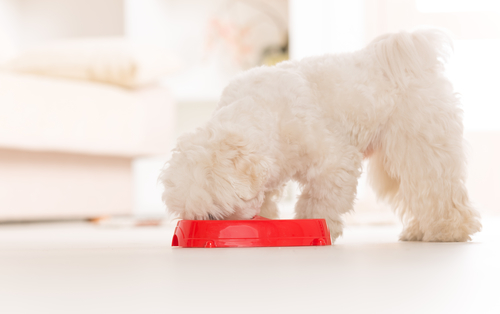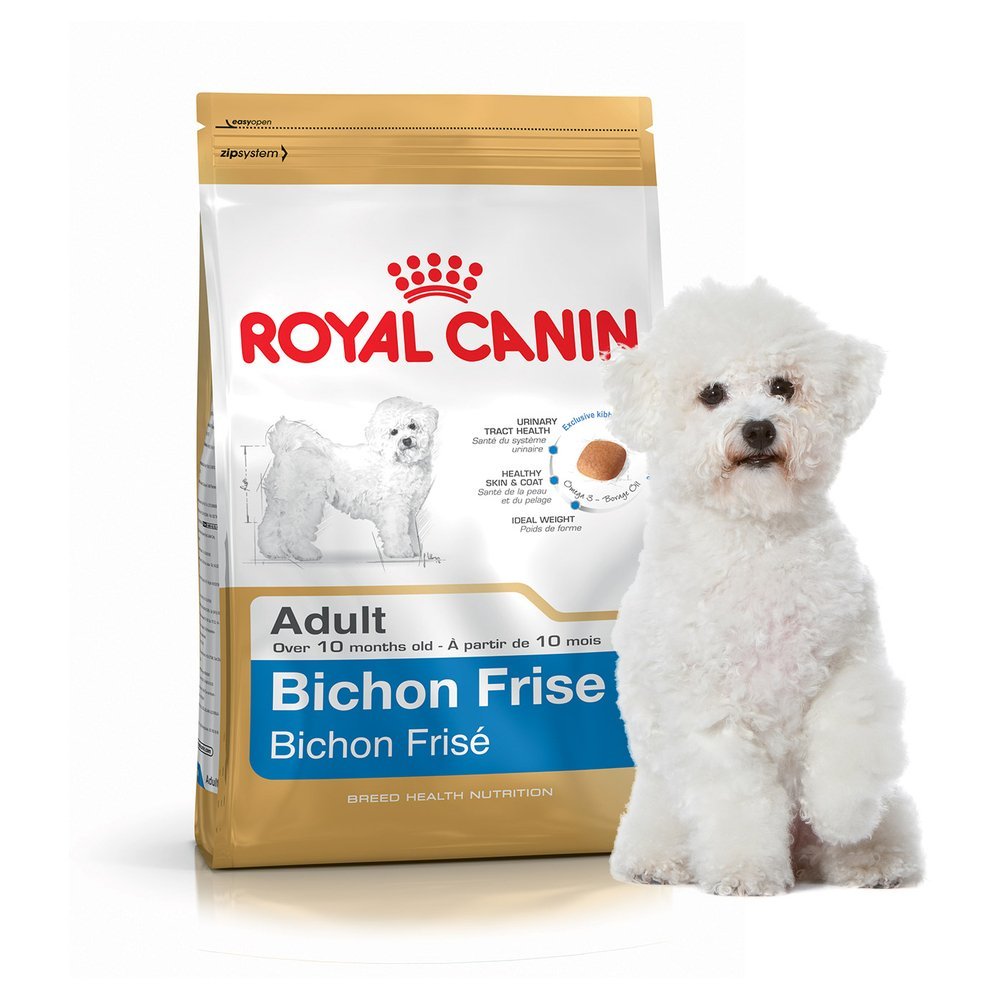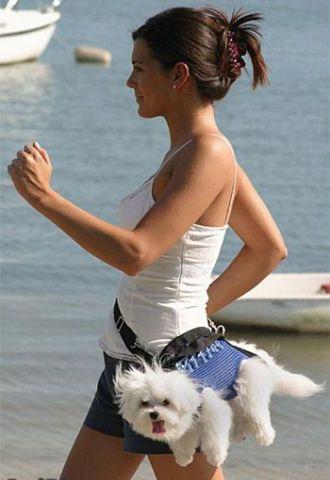What is the best diet for Bichon Frise puppies? With so many choices, feeding your new Bichon Frise puppy can be a challenge and gets very confusing!
And, to make it even more confounding, small breeds like Bichon Frises have different needs from large breeds.

There are many schools of thought on feeding dogs. Some vets suggest raw foods while others warn strictly against using them.
Other veterinarians think homemade dog foods are best, while some think that nutrition is lacking in homemade dog foods, because the recipes don’t include everything a dog needs.
This article will discuss:
- Can Bichon puppies grow too fast?
- What puppies should eat
- Best Food for small breed puppies
- When to switch to adult dog food
- How to transition from puppy food to adult food
- How often should you feed your puppy?
- Hypoglycemia in puppies
- Water for puppies
Can Puppies Grow too Fast?
Many people think that roly, poly chunky puppies are cute and healthy. However, that’s not true.
Well, it is true that they are cute, but puppies that are overweight are not healthy.
Instead of feeding our small breed dogs so that they grow as fast as possible, we should be feeding them to grow at a healthy rate. A controlled weight.
If you happen to also have a large breed dog like the yellow lab (over 55 lb. when full grown) you’ll need to be especially careful with that dog, as puppies who grow too fast often end up with serious joint problems. These include osteochondrosis, hip dysplasia, hypertrophic osteodystrophy and Wobbler’s syndrome.
Of course an obese puppy also risks getting diabetes or heart disease.
If you give your dog a fast growth puppy food, you could actually be hurting your pup. When a puppy gains weight too fast, it puts stress on her bones, ligaments, and cartilage. Your puppy needs to grow at a rate that is healthy for her.
Keep in mind that your dog’s adult size is hereditary, not determined by the amount of food that you feed him. Feeding him more food won’t make him grow to be a larger adult dog.
What Puppies Should Eat
Very Young Puppies
Your Bichon puppy’s diet is determined by her age. Young puppies drink milk from their mother, until they start to get teeth. At that point, Mom weans the puppies and then they get a puppy milk replacement that you give to a little puppy with a special puppy bottle
.
Later, when they are between 6 and 8 weeks old, puppies are transitioned to puppy food.
By the time they are 8 weeks old, a puppy is usually eating puppy food or kibble.
Why would you need to know this? Well, occasionally puppies leave the breeder’s before they are 8 weeks old and your new puppy might be a bit young to leave the nest. Sometimes a puppy is rejected by its mother. Others are orphaned. And still others have to find new homes because the breeder has a health issue or other special circumstances.
Puppies 8 Weeks and Older
When you first bring your 8 week old puppy home, consider feeding her the same brand puppy food that she was eating at the breeder’s. She is used to eating that food, and a new food can be stressful for her, and may upset your dog’s digestive system. You want your puppy’s first few days to be as stress-free as possible.
Later, when the excitement of the first few days has died down, you can switch to another dog food. If you do this, follow the same procedure for transition that I talk about below.
Because puppies are growing fast, they do need more calories than adult dogs to support their growth and high energy levels. Bichon Frises, of course, are very active dogs. So, even as puppies, they need the right kind of puppy food to keep them healthy and energetic.
Did you know that an 8 week old puppy needs twice as many calories as his Mom or Dad? This age puppy needs extra protein, calcium, fat and phosphorus. Quality commercial dog foods provide the proper balance of ingredients.
Bichon Frise puppies need to have a small breed puppy food. When they have the right nutrition and you follow the manufacturer’s directions, your puppy will grow at a healthy rate and not become fat.
Stay away from puppy foods for large breeds, as they were not developed for your little dog.
When to Switch to Adult Dog Food
When your puppy stops growing, she can start eating adult dog food. This is usually around a year old, but breeds do differ. For example, most Bichon Frises are considered to be full grown by 8 months. However, if your puppy is still growing, she needs to stay on puppy food until her growth stops.
So how will you know? When your puppy has stopped growing, he will start to gain excess weight. That’s because he doesn’t need all that extra nutrition for growth anymore.
If you weigh your puppy regularly, you’ll get a feel for how fast he gains weight. When he’s about the right age and he starts to gain weight at a faster rate, take a closer look. If your dog is getting fatter and losing his lean look, it’s time to change to adult food.
Most veterinarians agree that puppies can start eating adult food when they are between 6 and 10 months old. Because breeds tend to mature at different rates, you can get some guidance on this from your vet.
How to Transition from Puppy Food to Adult Food

You’ve decided that it’s time to make the change to adult dog food. Just how do you do this?
Well, you don’t want to do this too fast. If you just start giving your dog adult food all at once, she will have trouble with digestion. And you will be cleaning up vomit and diarrhea.
There’s a better way to do this. It takes a week or two, but once your puppy has transitioned to her new food, you’re done!
After you’ve decided on the new dog food, here’s how you transition:
Determine how much adult dog food your dog will need. If you will be using commercial dog food, you will find guidelines to use on the bag or package.
- Days 1-3: 2/3 puppy food and 1/3 adult food
- Days 4-6: ½ puppy food and ½ adult food
- Days 7-9: 1/3 puppy food and 2/3 adult food
- Day 10: You’re there! Full portion of adult dog food.
Best Food for Small Breed Puppies
So what is the best diet for puppies, in particular, Bichon Frise puppies?
You do have some choices to make. The easiest is commercial dog food. On the bag, you’ll find guidelines on how much to feed your dog. Since all dogs are unique, you still have to keep an eye on your dog’s weight, until you are sure that you have the right amount.
Homemade dog food is a little trickier. It’s more work for you, and you need to make sure that the recipe is balanced for a small breed dog.
Best Brands Food for a Puppy Diet
Of course, there is no one brand of dog food that is best for every dog. Owners have had varying experiences with the same brand.
But there are some that do stand out from the others. And pet parents that feed them to their dogs are most happy with these brands:
Taste of the Wild – Budget Friendly
Taste of the Wild dog foods are made by a family owned company that strives to keep its products affordable. The company also has safety protocols in place that they use to ensure that their foods are safe and healthy.
Unlike many of the inexpensive dog foods on the market, this line uses only high quality ingredients. You’ll find protein sources like real wild boar, bison, smoked trout, roasted duck, venison and Angus beef as the main ingredient—not grains or other fillers.
Taste of the Wild has dog food for any stage of your dog’s life, wet or dry, from very young to senior.
If your goal is to feed your puppy like his ancestors, the wolves, then this could be your dog food of choice.
Royal Canin – Give Your Dog the Royal Treatment
The Royal Canin company, a French company that now sells their dog food internationally, works to make their dog foods healthy while preserving the environment.
Royal Canin dog foods are designed to address digestive sensitivities, joint pain and even cardiac issues. They have a balanced intestinal flora to promote good stool quality.
Royal Canin offers dog foods for all ages, wet or dry, and even a couple of breed specific dog foods. You can find their small breed puppy food here.
Orijen, “The Food That Dogs Should Eat”
Orijen pet foods are made by Champion Petfoods. They have researched dogs and wolves in the wild, and they use formulas that include foods that dogs are supposed to eat. The company uses only fresh, regional foods, and they never outsource any part of their manufacturing processes.
Champion Petfoods offers a wide selection in the Orijen line, including foods for all life stages and foods for special needs, like grain-free and weight control dog foods. Access their small breed puppy food here.
Hill’s Science Diet – Developed by Vets and Nutritionists
While Hill’s Science Diet wins the award for the best wet (canned) puppy food, they also offer small breed dry puppy food kibbles.
The company’s claim to fame is that they have designed the dog food, based on the input of hundreds of veterinarians and pet nutritionists.
Hill’s offers a number of choices, including foods for increased mobility, weight management, and skin sensitivity.
Blue Buffalo – Always All Natural
This is a U.S. based company, and all food is made in the United States. The company prides itself on adhering to nutritional standards from the Association of American Feed Control Officials and the Global Nutrition Committee of the World Small Animal Veterinary Association. All of its products are made from natural ingredients.
You can buy Blue Buffalo puppy food in both dry and wet versions, and its dog food has formulas that are based on breed size.
Purina – Trusted for 90 Years
Purina has the advantage of brand recognition. We’ve all heard of Purina dog food. Purina has been making dog food for 90 years. In fact, I used to live a couple of miles away from one of their plants in Pennsylvania.
The company is constantly developing new products and is also concerned with sustaining our environment.
Purina offers a small breed puppy formula that has live probiotics. It also contains DHA and omega-3 rich fish oils to support healthy brain and vision development.
Wellness Pet Food – All Natural
Wellness Pet Food is made in the USA using natural recipes with wholesome, non GMO ingredients that are chosen for their nutritional benefits.
Their small breed puppy food is crafted, using no meat byproducts, fillers or artificial preservatives. It does contain DHA from salmon oil
Wellness Dog Food is designed to give your dog healthy teeth and bones, a healthy brain, and overall energy, strength and endurance.
How Often Should you Feed your Puppy?
When puppies are little, they tend to get hungry more often than when they are older. Some owners give their puppies up to 5 or 6 small meals a day.
Others even leave dry puppy food out, so that puppies can feed on demand or have access to food when they are hungry. If you decide to feed on demand, keep in mind that canned dog food or food wet with milk or yogurt can attract bacteria that can make your dog sick. Feeding on demand only works with dry dog food.
Very young puppies should be fed at least 3-4 times a day. When your puppy is a bit older, you can feed him 2-3 times a day, and he’ll do just fine.
So how do you decide? One argument for a using a puppy feeding schedule is that it helps you with house training your puppy. Most puppies will need to poop about 30 minutes after they eat a meal.
With this knowledge in hand, you can easily establish a regular schedule for peeing and pooping outside. Which, of course, is where you want this to happen!
Hypoglycemia in Puppies
Hypoglycemia or low blood sugar is a condition that can be life-threatening to puppies. Puppies become hypoglycemic when they aren’t getting enough to eat or they don’t eat often enough.
If your puppy has hypoglycemia, you’ll see these symptoms:
- He appears to be drunk
- Wobbly when he walks
- Doesn’t respond appropriately to you or his surroundings
This is most often a problem for smaller breeds like the Bichon Frise. Your little puppy will need to have meals at regular hours, so his blood sugar levels remain constant.
If a dog becomes hypoglycemic, this usually happens if they have exercised or played a lot, without getting enough to eat.
To avoid problems with your Bichon puppy after exercise, give him a snack to hold him over until the next meal.
Water for your Puppy
Make sure that you have water available to your dog at all times. Puppies, just like older dogs, need fresh water on demand.
Your puppy needs to drink water as soon as he needs it, because he can quickly become dehydrated.
If your puppy drinks more or less than usual, it could be a sign that something is wrong. However, if you feed your dog canned food or wet food, he will not drink as much as if he’s eating dry dog food. And that’s normal.
If you must be away from your puppy for a few hours each day, consider getting an automatic pet waterer so that he’ll have always have fresh water available.
Feeding your puppy is perhaps the most important part of puppy care. However, if you take a little time in the beginning, to decide on your approach, you’ll do just fine.
Once you make a decision, then you just need to be consistent, with the times that you feed your new dog and the kind of food that you feed him.







Leave a Reply